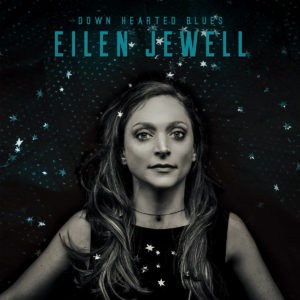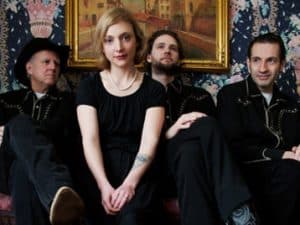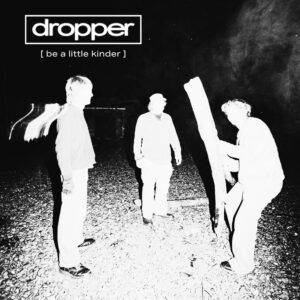Eilen Jewell’s Singin’ The Blues (Interview)
Boise, Idaho’s finest, Eilen Jewell, returns to Auckland’s Tuning Fork on Saturday, June 2nd.
Since her last visit here, Jewell has recorded and released a collection of blues covers titled Downhearted Blues.
The album finds Eilen singing old blues from the likes of Memphis Minnie and Willie Dixon.
The 13th Floor’s Marty Duda caught up to Eilen Jewell just as she was laying down a few new tunes before heading back on the road.
Click here to listen to the interview with Eilen Jewell:
Or, read a transcription of the interview here:
MD: You’ve been singin’ the blues…
EJ: Yeah, I’ve really been enjoying this. My latest album was a lot of fun to put together. And – it’s also been really fun to see how people respond to it.
MD: And how have they responded to it?
EJ: It’s been… all positive. I mean, the only real objections come from folks who just really want some new original stuff. We are working on that, too. So, that will be coming shortly.
 MD: Ah, okay. Cause I think I saw someplace that you’ve been in the studio recently, is that right?
MD: Ah, okay. Cause I think I saw someplace that you’ve been in the studio recently, is that right?
EJ: Yeah! Just last week. We were in the studio, and we recorded about six songs, I believe. So that’s a pretty darn good stride forward.
MD: Well, I guess it’s been a while since – do you have a stockpile of original songs, or do you just kind of write as you need them?
EJ: You know, I’ve just…been kinda always writing, but I don’t exactly stockpile them. I have a lot of – I do stockpile some sketches, but, um, I don’t really flesh out a song until I’m ready to sit down and really write. But normally I don’t really have time to sit down and write, so I just keep track of song ideas and maybe little sketches. And then at some point I look through them and see if anything is ready to become a song.
I think because I was pretty snobby when I was in high school… everyone else wanted to play the electric guitar, and I thought, ‘If that’s what everyone else wants to do, then I’m going to play the acoustic guitar’.
MD: And so the six that you worked on in the studio last week, do they sound pretty much [like] what you’ve been doing? Has there been any kind of change? Anything that’s inspiring you?
EJ: Well, I’m – I’ve been writing a lot in open tuning, so they have this kind of a, a droning sound, which a lot of blues artists recorded in, so I think I’m finally acknowledging my blues roots. In terms of my own musical education, such as it’s been. So yeah, lots of open tuning and lots of electric guitar, which is totally new for me. And, that’s been really fun – the electric guitar is just… it sounds obvious to say this out loud, but it’s been dawning on me slowly that it’s really a separate instrument. It’s just completely – to my mind, it’s so different from the acoustic guitar. And it’s been really fun to learn more about electric guitars. And, it’s almost like I had – I have always loved the sound of electric guitars, but for some reason… I think because I was pretty snobby when I was in high school… everyone else wanted to play the electric guitar, and I thought, ‘If that’s what everyone else wants to do, then I’m going to play the acoustic guitar.’ It was my way of being a rebel . So now I’m realizing there’s really no need to continue rebelling against my high school classmates.
MD: Probably not, yeah. So have you got, like, favourite electric guitar players that you’ve been checking out and listening to?
EJ: Well, yeah! Jerry Miller has for a long time been my favourite electric guitar player. My Jerry Miller, that is. But I really like a lot of the early rock ‘n’ roll sounds, like I love what The Kinks did with their guitars, I think they were just, pure genius. And um, there’s a lot of great country artists, of course. But you know, Jerry’s been showing me some stuff on the guitar, and I just feel like it’s – I’ve been…very grateful to have him, as a teacher.
MD: And how does he feel about you taking on the electric guitar?
EJ: He’s been encouraging me for – I think it’s been coming up for years. Every now and then the idea has resurfaced, and he’s always encouraged my going out and getting a guitar and at least trying it, you know. So we worked it into the live set, and he um, he and the rest of the band have been very excited about it. In fact, they’ve said to me, “Oh yeah, you can just go ahead and just make that as loud as you want, you just point it over here at us.” Like, they love it so much. I don’t think there’s any turning back now.
MD: Right, right. You’ve unleashed the beast.
EJ: Yeah! Exactly.
No one that I knew was listening to this stuff, which is part of what made it appealing to me.
 MD: …You’ll become a dual-guitar kind of a tag-team, turning into Thin Lizzy or something.
MD: …You’ll become a dual-guitar kind of a tag-team, turning into Thin Lizzy or something.
Fantastic. Well, I assume that when you come here to Auckland, you’re going to be performing a lot of stuff off the Down Hearted Blues album though, because that’s the most recent. And I was wondering – you mentioned your musical education – I was wondering because most of the songs that are on that album aren’t the most well-known of blues songs. How much of an education did you – did you know these songs already? Or did you do some research to find them? How did you come about discovering these songs?
EJ: Roughly half of them are songs that I’ve been loving for a long time, that are really integral to my blues music education. And songs that I discovered as a fifteen-year-old in Boise, Idaho. No one that I knew was listening to this stuff, which is part of what made it appealing to me. You know, it was like my very own personal discovery – and my form of rebellion.
But the other half are songs that I’ve just been – I feel like they came to me, mostly, through a radio programme that Jason and I have been fans of for a long time, called Backwoods [WMBR 88.1 FM]. Which is out of MIT, in Cambridge, Massachusetts. The DJ is this man, he’s a friend of ours named John Funke, and he just has this vast… collection of mostly 45s, old, scratchy records, that he plays every Saturday. And, he… every now and then, he’ll just play something that just sounds like – “oh, that needs to be performed by us.”
I don’t know what it is about it, if It’s the minor key, or if it’s the message or what, but I’ve been compiling this list mostly from his program of recent discoveries over the past couple years. I would lose the list for a while, and then… cause my desk is really messy, and then I would uncover it on the desk a year later, and be like “Oh yeah, those songs.” And I just always kinda meant to look into performing those songs live, maybe just working them into the live set. When it came time for this idea of the blues record, it was really just a matter of thinking about what my most important blues songs were from my past and then what was on this list, trying to figure out if any of that was something that we could play. And they all were, I’m pretty sure. Maybe there was only one or two from that list, that just didn’t seem to fit what we were doing. And then one song was recommended by Jerry Miller, our guitar player. It was a Moonshine Kate’s song, Poor Girl’s Story . He’s a Moonshine Kate fan. I didn’t know anything about her, so, it was really fun to just… delve in.
MD: Right. As it turns out, everybody thinks that the blues singers are like, Howlin’ Wolf and Muddy Waters or something, but originally, back in the early ’20s, it was mostly female singers that were blue singers before the men took it over. People like Memphis Minnie and those.
EJ: Yeah. And I really tried to lean heavy towards some of the more obscure female blues artists. I mean, they’re not obscure if you’re familiar with the blues, but just in terms of being a household name – like Big Maybelle, I don’t think is a household name, though she should be. And… Moonshine Kate certainly… But, yeah, it was really fun. It’s really just my way of paying respect to these blues artists, and… who knows, maybe some of the young whippersnappers of today will hear my album and think, “Who did this originally?” And then be intrigued and go do their own research.
I can’t imitate Howlin’ Wolf. That would be silly. So I tried to just – sing it how I would sing it.
MD: Yeah, that is how it works. And I’m curious as to how you’ve kind of approached these songs vocally. Because, I mean, you aren’t Memphis Minnie – you are who you are – so did you have to adjust your approach to singing? Or did you just kind of take on what you do, and make the songs fit them?
EJ: Yeah, I try to… I tried to avoid imitation. That’s always the struggle when you’re covering somebody else. Because the original is already so great. You don’t – there’s no need to replicate or duplicate. So it is tricky, and um – and my band – I mean they can play anything. So sometimes they just really wanna play things exactly like the record, just because they can. I think because it’s really fun for them to look back and say, “Oh look, we sound just like the record.” But when we talk about it, we all know that there’s really no point in doing that. So we do try to give it our own personal flavour, and without altering it too much. So it’s a fine line.
And, really what it comes down to is feeling comfortable with the lyrics and with the groove. Does it come together? Does it function as a song in the studio? Does it feel like something we could do – can it be part of our family – in a sense, our setlist is kind of like our group of children. Can it belong in that group? And so… yeah, we did do one Howlin’ Wolf song, because Howlin’ Wolf was really my gateway into the blues. And so I felt like it wouldn’t be right to leave him out. But it was really tricky to choose a Howlin’ Wolf song because he’s so… I mean, his songs are just so Howlin’ Wolf, you know. But I can’t imitate Howlin’ Wolf. That would be silly. So I tried to just – sing it how I would sing it. Essentially, I tried to imagine that I had written the song, like, pretend like this is one of my songs. And… how would I sing this? How would I deliver this message? So – I hope like it came across and it wasn’t too imitative.
MD: I don’t think it was. You have a hard time sounding like Howlin’ Wolf, I’m sure!
EJ: Yeah! Even if I wanted to.
MD: What was it about Howlin’ Wolf that drew you to him and made him stand out, as opposed to anybody else that you might’ve been listening to?
EJ: Well, he was, um… my dad was a big, is still a big music fan, and music lover, and he was tapped into the 60s blues revival scene, that was happening. And he had this great collection of old dusty records that had survived all kinds of, just, terrible things. Like, he was hauling them up to Alaska, in an Airstream trailer, and the trailer wrecked on the Alcan. And… got filled with snow, and I think there was a fire involved… so these things looked…gnarly.
Twenty years later, thirty years later – it was probably in the 90s, and they were just mouldy as hell, and dusty, scratchy. And they were upstairs in our attic, of our garage. So… really no reason why I should’ve ever found them. But I did, and when I pulled them out, I just somehow… you know, sometimes you just know that something is going to be important. I pulled out this Howlin’ Wolf record from this dusty collection, and just thought… I looked at his face and – I mean I know I felt the name ‘Howlin’ Wolf’ is amazing. And, as a fifteen-year-old, in Boise, Idaho, you don’t encounter very many Howlin’ Wolves. So I just – I saw the picture and just knew it was gonna be great And I went to a yard sale and just got my own turntable, cause ours had broken a long time ago, a long time before that. Played it, and sure enough…it was, it was love at first listen. So it was really – Howlin’ Wolf, and actually, Mississippi John Hurt, too, who I wanted to include but didn’t get around to it.
MD: Well, at least there’s always an opportunity for a Volume Two, I guess, so.
EJ: Yeah! I would love that. I’d do Volume Two Hundred and Two, it was so fun.
Click here for tickets and more info to see Eilen Jewell and her band at The Tuning Fork.
